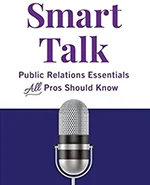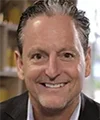 |
TAKING THE LEAD WITH MELISSA VELA-WILLIAMSON, APR, CDP,
I recently sat down with PR agency owner Melissa Vela-Williamson, APR, CDP, author of the recently published Smart Talk: Public Relations Essentials All Pros Should Know. During our conversation, she offered her insights on trust, diversity, mindset, and other critical leadership issues.
Here are excerpts from the full video interview:
In “Smart Talk” you mention how important it is for PR professionals to build trust. Why is that also critical for anyone who wants to be an effective leader?
There can't be leadership without trust. Real leaders guide through influence. I've been in many positions and opportunities where I was the sole communicator, but that meant I had dotted lines everywhere—so I led through influence. Without that, you can't be seen as an advisor when people won't follow you out of their own want to do so. Many employees may have to follow leaders, but they'll only do that for the short term. For the long haul and in true partnership with employees and your followers, that has to be built with trust.
You encourage PR pros to “Just say the hard thing”. Why is that so critical, and what are your tips for leaders who want to do so?
Well, first of all, I think anyone who does public relations is a leader. From my very first days as a PR coordinator, when I knew nothing about the profession, I was being called on to make some pretty hard decisions in the moment. So, it's our job as PR pros to really offer that ethical, helpful counsel to all types of clients, internal or external. When it comes to leadership, your followers are your most important stakeholders. Often, if we don't have the type of conversations where we must say the hard thing, that leads to mistakes, confusion, and unresolved tension that creates bigger issues in our relationships and in our work.
Your book mentions and supports the seven principles from the Arthur Page Society. I won’t list them all here, but all of them are in sync with great leadership. Why do you think there is such a connection between being a great communicator and being a great leader?
If you can't communicate well, you can't possibly lead well. We must start with being able to share a vision, and then articulate it in a way that makes people feel passionate about it and want to come along with us on that journey. Leadership doesn't always come in direct reports. Some of our most influential leaders do it from a place of being a true guiding example. That said, you must have guiding principles first for yourself as a person to be a good leader because leadership starts from within.
I found these principles in a very chaotic time where things seem to be changing every day and almost every moment. They felt very grounding, very timeless. We must say what we mean, and we have to back it up with action. We must understand that character starts from within, and that organizations are made up of people. There's no “brand” unless it's brought to light by humans. You don't want to be a great professional who has personal failings that throw you off your career path and your life path.
In “Smart Talk,” you discuss the importance of mindset, especially a growth mindset. What does that mean for you?
Mindset is, to me, how we view things in our life or what we believe, and that paradigm will shape everything we do. The first mentors at the start of my career were self-help books. I didn't know anyone like me who had worked in PR as a first generation college graduate, and so a lot of it was kind of paving my own path.
But a growth mindset to me means that I'm not done learning. If I don't know everything today, I can still acquire it tomorrow. In PR, it's dynamic, it's evolving. We can't just say, “Well, I learned this when I started 20 years ago. That's how we've always done it, and that's how we'll always do it.” We must accept that we're never done learning and we embrace that challenge throughout our careers.
You are a Certified Diversity Professional(CDP)®. How can leaders (or anyone for that matter) make sure they’re not sharing micro-aggressions, and not “othering”?
“Othering” is when we communicate that someone is outside of our in-group, that they are different from “us,” and that feels like there's a negative context around it. We've all been othered in some situations. We all have very complex identities made of different parts of ourselves and in the workplace, we're there's a lot of talk about being your whole self as a leader and your whole self at work. However, not everyone's quite ready for that communication-wise.
I like to intersect DEI principles with PR principles because they align quite naturally. You have to make a conscious effort to really see that, think about it, and activate it. In this space, I come to it with a very bridge-building point of view where it's not polarizing. I'm here to bring different groups of people together and help you make that conscious effort to think before you communicate.
If I can leave you with one tip, just try that. Take that second to stop, think, and read the room. When it comes to people's hearts and culture, you're not going to make everyone happy. But we want to look for a majority where it's most commonly accepted and appreciated.
***
Ken Jacobs is the principal of Jacobs Consulting & Executive Coaching, which empowers PR and communications leaders and executives to breakthrough results via executive coaching, and helps communications agencies achieve their business development, profitability, and client service goals, via consulting and training. You can find him at www.jacobscomm.com, [email protected] @KensViews, or on LinkedIn.


 Just because a job can be done remotely, doesn't mean it should.
Just because a job can be done remotely, doesn't mean it should. At about 9 a.m. on April 17, 2008, an executive vice president at Ogilvy Public Relations Worldwide asked me to come to her office. I had no idea why, least of all at so early an hour.
At about 9 a.m. on April 17, 2008, an executive vice president at Ogilvy Public Relations Worldwide asked me to come to her office. I had no idea why, least of all at so early an hour. For anyone in PR, continuing to thrive after 30 years or more is a pretty substantial victory. For CashmanKatz, we credit our success to six key beliefs.
For anyone in PR, continuing to thrive after 30 years or more is a pretty substantial victory. For CashmanKatz, we credit our success to six key beliefs. My recognition at PRSA New York's Big Apple Awards 15 Under 35 Class of 2022 led me to connect with a wide, high-quality circle of supportive colleagues and mentors.
My recognition at PRSA New York's Big Apple Awards 15 Under 35 Class of 2022 led me to connect with a wide, high-quality circle of supportive colleagues and mentors.


 Have a comment? Send it to
Have a comment? Send it to 
Mar. 6, 2023, by Joe Honick
The interview with Ms Vella-Williamson re: her book was practical in every aspect but one: teaching clients how to speak effectively in all circumstances. This has been fundamental to our work for years in preparing bright and brilliant...or maybe not so bright and brilliant...clients for their appearances before a few people or lots of people. Some of the most famous people we know have been most efficient in putting audiences to sleep or wondering why they came. The same goes for audiences of smaller size, even interviewing. It's not easy to persuade someone of the need to learn speaking techniques, but it's extremely important...and practical.